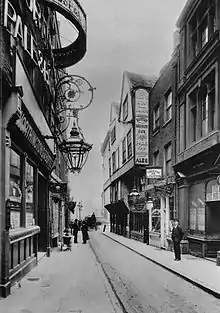Wych Street
Wych Street was a street in London, roughly where Australia House now stands on Aldwych. It ran west from the church of St Clement Danes on the Strand to a point towards the southern end of Drury Lane. The street was demolished by the London County Council in around 1901, as part of the redevelopment that created the Kingsway and Aldwych.

History
_p111_-_Temple_(map).jpg.webp)
The area around Drury Lane was not affected by the Great Fire of London, and contained decrepit Elizabethan houses, with projecting wooden jetties. The Angel Inn public house was at the bottom of Wych Street, by the Strand. To the west, about halfway along on the north side, was the New Inn, an Inn of Chancery where Sir Thomas More received his early legal education, and, to the south, Lyon's Inn, another Inn of Chancery where Sir Edward Coke was a reader in 1578,[1] which was replaced by a Globe Theatre and the Opera Comique in c.1863.

At the western end was Drury House, the house of Sir Robert Drury, from which Drury Lane took its name, later rebuilt as Craven House by Lord Craven, and finally turned into a public house, the "Queen of Bohemia", named after Lord Craven's unrequited love, Elizabeth of Bohemia, the daughter of James I. This building was later demolished, and replaced by the first Olympic Theatre.
Jack Sheppard, the infamous thief, was apprenticed to a carpenter, Mr. Wood, on Wych Street; one of Sheppard's haunts, the White Lion tavern, was also on Wych Street. The music hall performer Arthur Lloyd lived at 39 Wych Street in 1892.
Around 1780, the brothers George and John Jacob Astor, who later became America's first multimillionaire, ran an instrument store in 26 Wych Street.
In popular culture
Where Was Wych Street? is one of the best loved short stories by Stacy Aumonier (1877–1928).
In Patrick O'Brian's novel Post Captain (1972), the character Dr. Stephen Maturin is in London in late September 1804, reporting to the Admiralty in his capacity as a naval intelligence agent. Having left the Admiralty building on Whitehall, he intends to "wander[] among the bookstalls of Wych Street," but because of the rain he decides instead to return to his inn. (Ch. 14.)
References
External links
- Where Was Wych Street? by Stacy Aumonier at Project Gutenberg.
- Old Houses In Wych Street, photographed by Henry Dixon in c.1881
- Wych Street, London, 1901
- "The Strand (northern tributaries): Clement's Inn, New Inn, Lyon's Inn etc.", Old and New London: Volume 3 (1878), pp. 32–5.
- Map